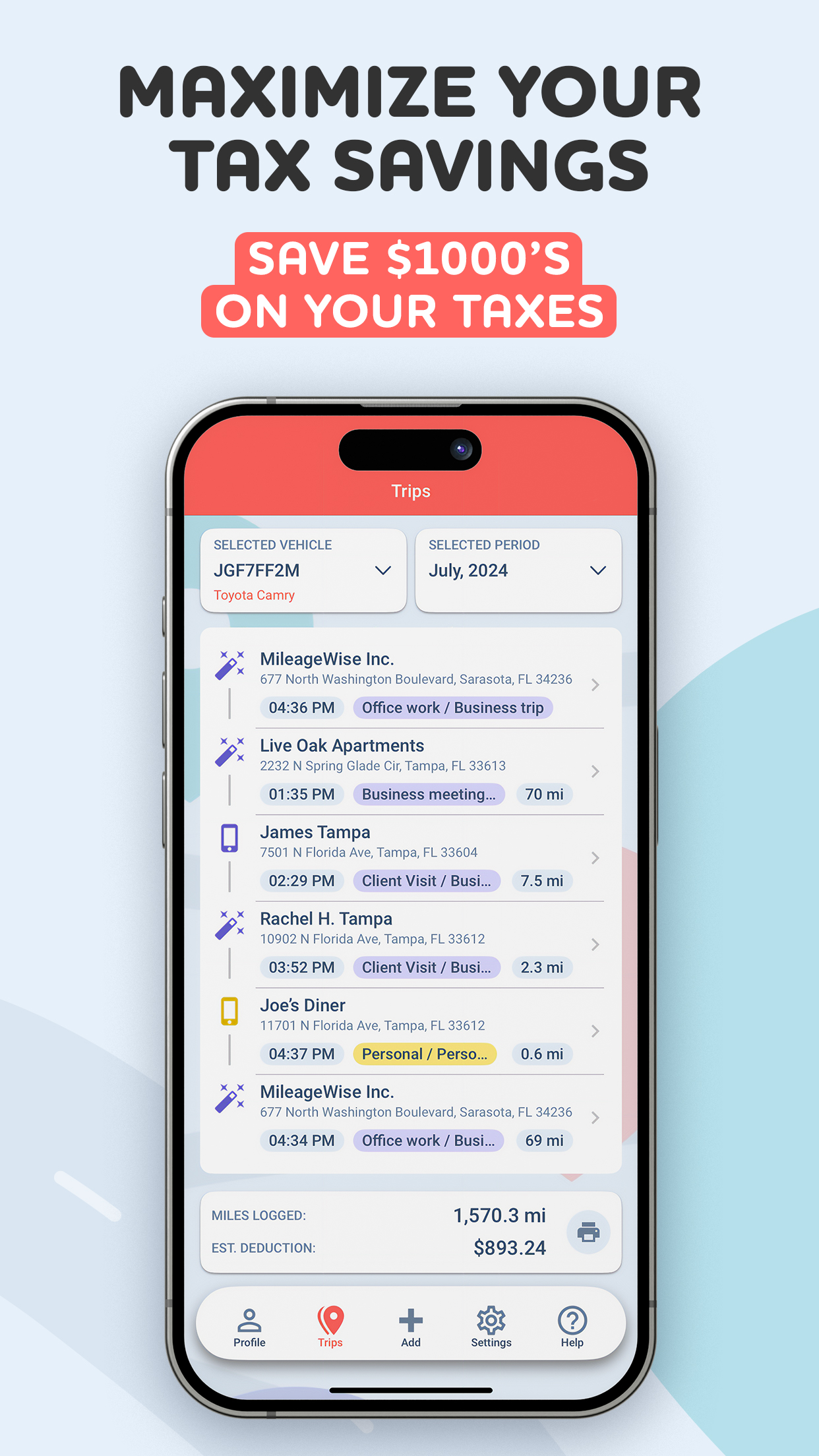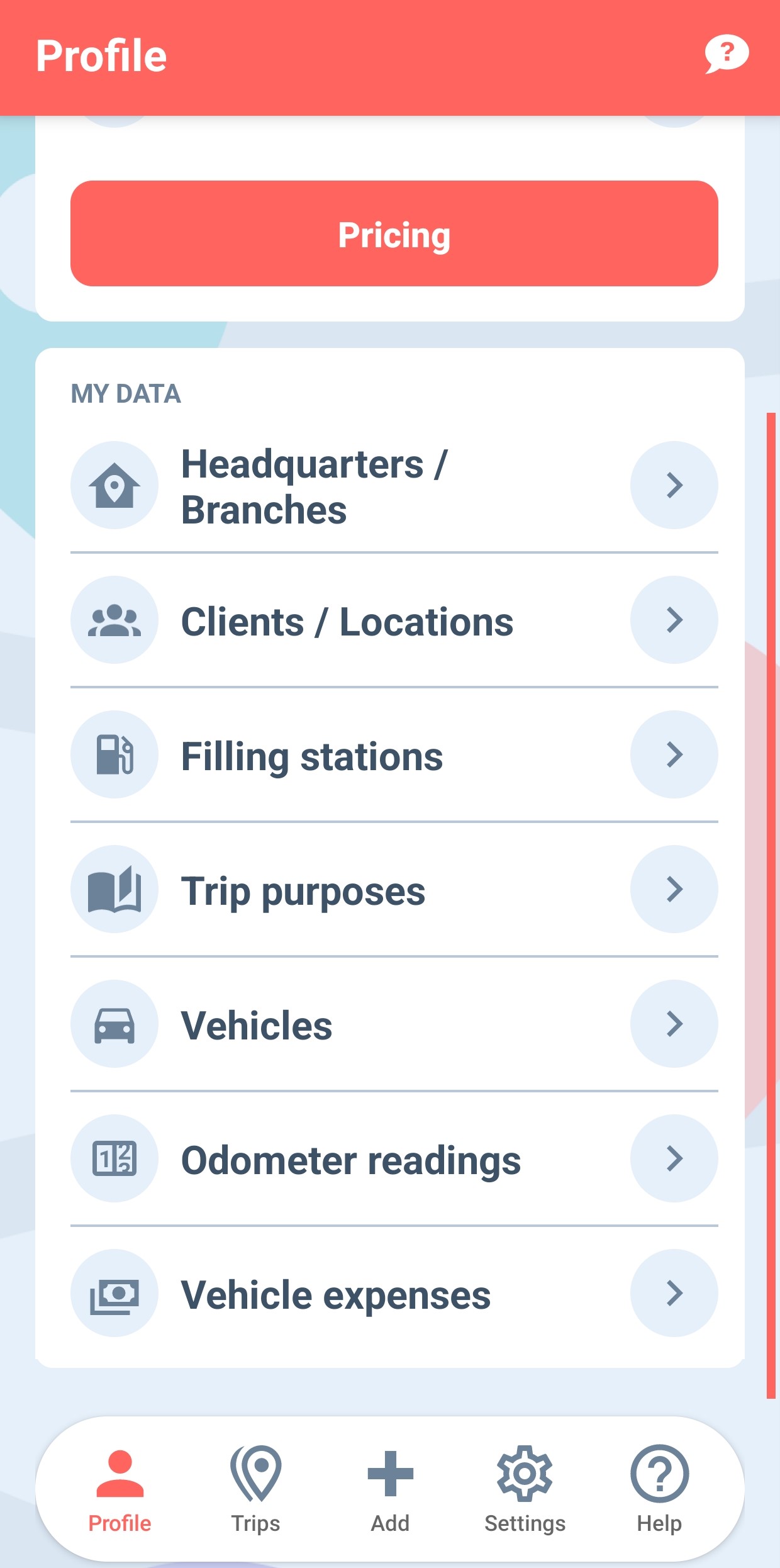Are you a self-employed individual or an employee with business-related travel expenses? If so, claiming a mileage deduction can significantly reduce your tax liability. In this guide, we’ll explore everything you need to know about mileage deductions, from eligibility criteria to calculation methods and record-keeping requirements.
Looking for a comprehensive mileage logging solution?
Use MileageWise to track your miles. This all-inclusive software guarantees precise documentation of your journeys, empowering you to maximize your tax deductions while adhering to Internal Revenue Service (IRS) guidelines for mileage logs. With our powerful Dashboard and intuitive Mobile App, managing your mileage has never been easier.
Table of Contents
What is Mileage Deduction?
Mileage deduction allows you to deduct a portion of the cost of driving your vehicle for business purposes from your taxes. It covers expenses like gas, oil, insurance, and vehicle depreciation.
Who Can Claim Mileage Deduction?
There are two main subgroups of those who are eligible for mileage deduction.
Self-Employed Individuals
If you’re a sole proprietor, independent contractor, or self-employed professional, you can claim a mileage deduction for business-related travel. This includes trips to client meetings, job sites, or shopping for supplies.
Employees
While employees generally cannot deduct mileage directly, they may be eligible for reimbursement from their employer. Also, these reimbursements are often tax-free.
How to Claim a Mileage Deduction as a Self-Employed Individual?
To claim a mileage deduction, you’ll need to report your business income and expenses on your self-employment tax return (Schedule C).
Steps to Claim the Deduction:
1. Keep accurate records to support your claim
You must either keep track of your vehicle expenses or keep a business mileage log.
2. Report Income and Expenses
On Schedule C, report your self-employment income and deduct your business expenses, including the mileage deduction.
3. File Your Tax Return
Attach Schedule C to your Form 1040 (individual income tax return) and file it with the IRS by the tax deadline.
How to Calculate Mileage Deductions?
As mentioned above, you have two options for calculating your mileage deduction:
The Standard Mileage Rate
This is a set rate per mile determined by the IRS. To calculate your deduction, multiply the number of business miles that you logged by the standard mileage rate.
The Actual Expense Method
This method allows you to deduct the actual costs of operating your vehicle. These expenses include fuel, repairs, and depreciation among others. Remember to keep a detailed log of your vehicle expenses and keep your receipts. To calculate your deduction, determine the percentage that you use your vehicle for business and multiply it by the amount of your deductible vehicle expenses.
Choose the method that will result in the largest deduction for your case. Usually, the standard mileage rate yields larger deductions, unless you operate a car with exceptionally high costs.
Mileage Logs
Maintaining a detailed mileage log is crucial for claiming a mileage deduction. Moreover, it helps you accurately track your business-related travel and the IRS can request it to support your claims.
IRS Mileage Log Requirements
To keep track of your mileage for taxes, your mileage log should include the following information:
- Starting and ending odometer readings of the year
- Date of the trip
- Starting and ending points
- Purpose (business or personal)
- Total mileage
Consequences of Inadequate Records
Failing to keep proper mileage records can lead to inaccurate records that can trigger IRS audits and result in the IRS not accepting mileage logs. Therefore, it’s essential to maintain accurate and complete records to avoid fines.
How to Track Your Mileage
There are several ways to track your mileage, including:
- Notebook: A notebook is a simple method to keep records on the go. On the other hand, this requires you to manually piece your notes together into an IRS mileage log.
- Spreadsheet: A mileage log spreadsheet can provide more transparency and flexibility as it allows you to make calculations. However, it can be inconvenient to keep updated on the road.
- Mileage Tracking Apps: These apps can automatically track your mileage and generate reports.
Mileage Deduction for Employees
You might also be eligible for mileage deduction if you are an employee.
Do Employers Have to Reimburse Employees for Mileage?
While employers are not legally required to reimburse employees for driving their car for work (except for the states of Massachusetts, California, and Illinois), many do so as a benefit.
Types of Employee Mileage Reimbursements
There are several types of mileage reimbursement methods for employees:
- Flat Rates: A fixed amount per mile is paid to employees.
- Combination of fixed and flexible allowance: Employers may offer a fixed allowance to cover everyday expenses like insurance and fuel, combined with additional reimbursement for repairs and maintenance.
- Car Allowance + Mileage Rate: If the employee’s fixed car allowance is insufficient to cover their actual business-related travel costs, they might be allowed to supplement it by claiming the standard mileage rate for unaccounted miles.
- Per Diem allowance: A daily allowance is provided to cover travel expenses, typically during business trips.
Consult with your manager to determine the type and the amount of your vehicle reimbursement.
Conclusion
Claiming a mileage deduction can be a valuable way to reduce your tax liability. By understanding the eligibility criteria, calculation methods, and IRS mileage log requirements, you can ensure that you’re taking full advantage of this tax break and comply with IRS regulations.
FAQs
Yes, you can claim a mileage deduction if you use your personal vehicle for business-related activities. This includes trips to client meetings, job sites, shipping for supplies and more.
To calculate your mileage deductions, you have two options:
- Standard Mileage Rate: The IRS sets a standard rate per mile. Multiply your total business miles by this rate.
- Actual Expense Method: Track your actual expenses like gas, oil, repairs, and depreciation. Calculate the percentage of your vehicle’s usage for business purposes and multiply it by your total expenses.
Choose the method that will result in the largest deduction for your specific circumstances.
To track your mileage, you can use a mileage log that records the date, starting and ending points, purpose of the trip, and total mileage driven. There are also mobile apps available that can automatically track your mileage.
Yes, there are some limitations. For example, you cannot deduct mileage for commuting to and from work. Additionally, you must keep accurate records of your business-related travel to support your deduction. If you have any specific questions about limitations or restrictions, it’s recommended to consult with a tax professional.
Rebeka Barefield
Level Up Your Mileage Tracking
Automatic Tracking: Tracks trips automatically via vehicle movement, Bluetooth, and Plug’N’Go without draining your battery.
AI-Powered Mileage Recovery: The AI Wizard helps reconstruct past mileage logs, filling gaps in your log to ensure compliance.
Built-in IRS Auditor: Checks and corrects up to 70 logical errors in logs, ensuring they meet IRS standards for tax deductions.
Web Dashboard & Team Collaboration: Manage logs, import trips, and collaborate with teams through the web dashboard, ideal for businesses.
Download MileageWise’s automatic mileage tracker app from Google Play or the App Store & try it for free for 14 days. No credit card required!

| MileageWise | Other Mileage Tracker Apps | Other GPS Based Trackers | Excel | Tax Professional | |
| Mobile App for Ongoing Tracking | |||||
| Web Dashboard to Manage Trips | |||||
| Imports Trips and Locations from Google Timeline | |||||
| Lifetime Deals Available | |||||
| Average Reported Business Mileage Deduction | $12,000 | $710-$8500 | $400-$5,700 | $200-$2,000 | |
| Average Time Creating Retrospective Mileage Log (Yearly) | 7 minutes | 180 minutes | 180 minutes | 180 minutes | N/A |
| AI Wizard Mileage Log Generator for Retroactive Mileage Recovery | |||||
| Produces IRS-Proof Mileage Logs | |||||
| Free Phone Support with Live Agent | |||||
| Mileage Log Preparation Service | |||||
| Data Accessible in the Cloud |








